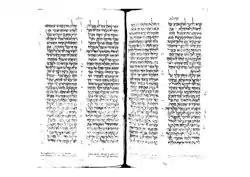Ecclesiastes 8
Ecclesiastes 8 is the eighth chapter of the Book of Ecclesiastes in the Hebrew Bible or the Old Testament of the Christian Bible.[1][2] The book contains philosophical speeches by a character called '(the) Qoheleth' (="the Teacher"), composed probably between 5th to 2nd century BCE.[3] Peshitta, Targum, and Talmud attribute the authorship of the book to King Solomon.[4] This chapter concerns human and divine authority with the advice that fear God is the wisest course.[5]
| Ecclesiastes 8 | |
|---|---|
 Hebrew Bible, MS Sassoon 1053, images 464-467 (Ecclesiastes). | |
| Book | Book of Ecclesiastes |
| Category | Ketuvim |
| Christian Bible part | Old Testament |
| Order in the Christian part | 21 |
Text
The original text was written in Hebrew. This chapter is divided into 17 verses.
Textual witnesses
Some early manuscripts containing the text of this chapter in Hebrew are of the Masoretic Text, which includes Codex Leningradensis (1008).[6][lower-alpha 1]
There is also a translation into Koine Greek known as the Septuagint, made in the last few centuries BCE. Extant ancient manuscripts of the Septuagint version include Codex Vaticanus (B; B; 4th century), Codex Sinaiticus (S; BHK: S; 4th century), and Codex Alexandrinus (A; A; 5th century).[8] The Greek text is probably derived from the work of Aquila of Sinope or his followers.[3]
Structure
New King James Version grouped the chapter:
- Ecclesiastes 8:1–8 = Obey Authorities for God's Sake
- Ecclesiastes 8:9–17 = Death Comes to All
Royal authority (8:1–9)
Verse 1 closes the theme from chapter 7.[9] Qoheleth then uses the previous observation of human authority to form a basis for understanding the divine authority.[5]
Verse 1
- Who is like the wise?
- And who knows the interpretation of a thing?
- A man's wisdom makes his face shine,
- and the hardness of his face is changed.[10]
- "Make his face shine": in Hebrew Bible this idiom is used of God (cf. Numbers 6:25).[11]
- "Hardness" (KJV: "boldness"; NKJV: "sternness"): literally, "strength".[12]
Fear God is the wisest course (8:10–17)
Echoing the idea in Ecclesiastes 3:16–17, Qoheleth affirms that it is still 'safer to stand in fear before God', even as the righteous are sometimes regarded as wicked and the punishment of the wicked seems lacking.[13]
Verse 15
- So I commended enjoyment, because a man has nothing better under the sun than to eat, drink, and be merry; for this will remain with him in his labor all the days of his life which God gives him under the sun.[14]
"To eat, drink, and be merry": refers to Ecclesiastes 2:23-24; 3:13; 5:18-20; 9:7,[11] as the remedy that Qoheleth offers, that is, to accept God's gift and place oneself in his hands.[15]
See also
- Related Bible parts: Numbers 6
Notes
- Since 1947 the whole book is missing from Aleppo Codex.[7]
References
- Halley 1965, p. 275.
- Holman Illustrated Bible Handbook. Holman Bible Publishers, Nashville, Tennessee. 2012.
- Weeks 2007, p. 423.
-
 Jastrow, Morris; Margoliouth, David Samuel (1901–1906). "Ecclesiastes, Book of". In Singer, Isidore; et al. (eds.). The Jewish Encyclopedia. New York: Funk & Wagnalls.
Jastrow, Morris; Margoliouth, David Samuel (1901–1906). "Ecclesiastes, Book of". In Singer, Isidore; et al. (eds.). The Jewish Encyclopedia. New York: Funk & Wagnalls. - Weeks 2007, p. 426.
- Würthwein 1995, pp. 35-37.
- P. W. Skehan (2003), "BIBLE (TEXTS)", New Catholic Encyclopedia, 2 (2nd ed.), Gale, pp. 355–362
- Würthwein 1995, pp. 73-74.
- Eaton 1994, pp. 615–616.
- Ecclesiastes 8:1 ESV
- Coogan 2007, p. 953 Hebrew Bible.
- Note [a] on Ecclesiastes 8:1 in NKJV
- Weeks 2007, pp. 426–427.
- Ecclesiastes 8:15 NKJV
- Eaton 1994, p. 616.
Sources
- Coogan, Michael David (2007). Coogan, Michael David; Brettler, Marc Zvi; Newsom, Carol Ann; Perkins, Pheme (eds.). The New Oxford Annotated Bible with the Apocryphal/Deuterocanonical Books: New Revised Standard Version, Issue 48 (Augmented 3rd ed.). Oxford University Press. ISBN 9780195288810.CS1 maint: ref=harv (link)
- Eaton, Michael A. (1994). "Ecclesiastes". In Carson, D. A.; France, R. T.; Motyer, J. A.; Wenham, G. J. (eds.). New Bible Commentary: 21st Century Edition (4, illustrated, reprint, revised ed.). Inter-Varsity Press. pp. 609–618. ISBN 9780851106489.CS1 maint: ref=harv (link)
- Halley, Henry H. (1965). Halley's Bible Handbook: an abbreviated Bible commentary (24th (revised) ed.). Zondervan Publishing House. ISBN 0-310-25720-4.CS1 maint: ref=harv (link)
- Weeks, Stuart (2007). "20. Ecclesiastes". In Barton, John; Muddiman, John (eds.). The Oxford Bible Commentary (first (paperback) ed.). Oxford University Press. pp. 423–429. ISBN 978-0199277186. Retrieved February 6, 2019.CS1 maint: ref=harv (link)
- Würthwein, Ernst (1995). The Text of the Old Testament. Translated by Rhodes, Erroll F. Grand Rapids, MI: Wm. B. Eerdmans. ISBN 0-8028-0788-7. Retrieved January 26, 2019.CS1 maint: ref=harv (link)
External links
| Wikisource has original text related to this article: |
| Look up Ecclesiastes in Wiktionary, the free dictionary. |
- Jewish translations:
- Kohelet – Ecclesiastes - Chapter 8 (Judaica Press) translation [with Rashi's commentary] at Chabad.org
- Christian translations:
- Online Bible at GospelHall.org (ESV, KJV, Darby, American Standard Version, Bible in Basic English)
- Ecclesiastes Chapter 8 King James Version
 Ecclesiastes public domain audiobook at LibriVox Various versions
Ecclesiastes public domain audiobook at LibriVox Various versions